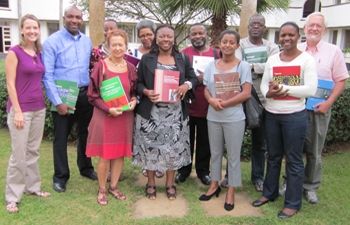
African journalists attended a demographic and health data workshop in Entebbe, Uganda, with the goal of improving the depth and quality of health reporting across the continent.

African journalists attended a demographic and health data workshop in Entebbe, Uganda, with the goal of improving the depth and quality of health reporting across the continent.
“This was enriching for me because of the very specific slant on handling of data in news reporting, which is very challenging even for someone who has been dealing with numbers for a long time,” said Emmanuel Wongibe, a media trainer from Cameroon.
The trainers – from nine African countries – will go on to educate hundreds of journalists on the use of demographic and health surveys, which provide some of the most comprehensive and accurate information available on health and living conditions and thus play a major role in shaping health programs and policies. Training will focus on survey methods, basic math and statistics, terminology, approaches to interpreting and analyzing data, techniques for identifying trends and graphical presentation of data. Its aim is to improve the depth and quality of information in news stories on health and population issues, a major goal of AHJA, which was formed in late May at the Rockefeller Conference Center in Bellagio, Italy.
“AHJA was established to give journalists throughout Africa the tools and resources they need to report clearly and accurately on matters related to health,” said Knight International Journalism Fellow Declan Okpalaeke, a Nigerian journalist who chairs the association’s Steering Committee. Okpalaeke said AHJA will work with national journalism associations and individuals all across Africa to bring demographic and data-reporting skills to as many reporters and editors as possible.
MEASURE DHS has worked with governments in more than 90 countries to conduct demographic and health surveys with funding from the US Agency for International Development (USAID). Its experts believe the Entebbe meeting will have an exponential impact on the quality of reporting by journalists throughout Africa.
“This was a very sophisticated and thoughtful group of journalists,” said Erica Nybro, who represented MEASURE DHS, an arm of the U.S. consulting firm ICF International. “When you provide just one of these journalists with training, you are, by extension, training hundreds."
Under the auspices of AHJA, training will be offered initially to journalists in Nigeria, South Africa, Ethiopia, Zambia and Mozambique. The association is looking for partners to help provide additional training in Ghana, Cameroon, Uganda, Senegal and other countries. MEASURE DHS and ICFJ, in collaboration with AHJA, also will develop a toolkit that will enable even more journalists to learn about demographic and health reporting. The toolkit is expected to be completed by this fall and will be available on the websites of ICFJ, Measure DHS and AHJA, whose site is still under construction.
For more on the Entebbe workshop, click here.
Editor's note: Christopher Conte is a media consultant based in Washington, DC, and a former Knight International Journalism Fellow in Uganda.